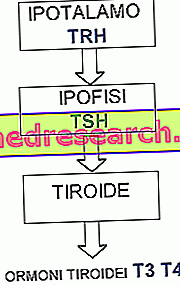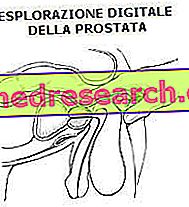What are
Thyroid hormones (T3 and T4) are secreted by the thyroid gland in response to the pituitary hormone TSH, whose production is in turn regulated by the hypothalamic hormone TRH.

Thyroid hormones, triiodothyronine (T3) and thyroxine (T4), are produced by thyroid follicular cells in response to TSH.
The secretion of thyroid hormones follows a circadian rhythm; the highest levels of T3 and T4 are reached during the night and the early hours of the morning, while the lowest levels are found between 12 and 21.
Functions
Thyroid hormones:
- regulate brain development of the fetus and infant
- are necessary for the development of the fetal skeleton
- they are indispensable for the normal growth of the child's body and for the maturation of the various systems, especially the skeletal system
- regulate the metabolic activity of the adult influencing the function of each organ and tissue, in particular:
- they have a thermogenetic action
- regulate glucose metabolism
- involved in lipolysis and lipogenesis
- regulate protein synthesis
- have effects on the cardiovascular system
THERMOGENETIC ACTION: the thyroid hormones increase the oxygen consumption at rest, raising the basal metabolism, the body temperature and the daily caloric requirement.
EFFECTS ON GLUCID METABOLISM: they favor glycogenolysis and gluconeogenesis, they also increase the activity of enzymes involved in glucose oxidation.
LIPOLYSIS AND LIPOGENESIS: thyroid hormones stimulate both lipolysis (use of fat for energy purposes), and lipogenesis (synthesis of adipose tissue), with a prevalent effect on lipolysis
PROTEIN SYNTHESIS: thyroid hormones increase protein synthesis and therefore have a trophic effect on the muscle; however if synthesized in excess they cause the opposite effect (muscular catabolism)
EFFECTS ON THE CARDIOVASCULAR SYSTEM: thyroid hormones increase myocardial contractility (positive inotropic effect), increase heart rate (positive chronotropic effect) and increase venous return to the heart; they are therefore essential for cardiac function
OTHER METABOLIC EFFECTS: thyroid hormones increase intestinal motility, promote the absorption of cyanocoballamin (vit. B12) and iron; increase the synthesis of erythropoietin, renal flow and glomerular filtration; they stimulate the endogenous production of other hormones (GH); they have a permissive role on reproductive functions and regulate the trophism of skin and appendages.
Thyroid hormones - Video: T3, T4 and TSH
X Problems with video playback? Reload from YouTube Go to Video Page Go to Wellness Destination Watch the video on youtubeThyroid hormones and physical exercise
Thyroid function is not very much influenced by physical activity, but suffers greatly from nutritional status. In particular during the fasting the sensitivity of the tissues towards thyroid hormones decreases, a sort of defense mechanism to lower the metabolism and avoid the waste of precious energies for the survival of the organism itself.
Synthesis
Role of iodine
The following are necessary for the synthesis of thyroid hormones:
- tyrosine, made available by thyroglobulin
- iodine that is transported against the gradient inside the thyrocyte thanks to the action of the NIS
- an enzyme catalyst (thyroperoxidase)
The active form of thyroid hormones is represented by T3, while T4 is about 15 times less active; at the peripheral level there are some enzymes, called desiodases, capable of removing an iodine atom from thyroxine (T4) transforming it into triiodothyronine (T3).
It is very important to introduce the right amount of iodine with the diet to ensure optimal functioning of the thyroid; the deficiency of this mineral can in fact lead to the development of diseases such as endemic goiter.
The intake of iodine in the diet is generally low; it is contained mainly in fish, while its presence in vegetables is dependent on the cultivation soil. In any case, to supply the organism with an adequate supply of this microelement, it is sufficient to use iodized salt instead of the traditional cooking salt.
To promote correct thyroid function, iodized salt must be used raw; it is useless to add it to the pasta during cooking as the high temperatures destroy this very important mineral.
Doping and Thyroid Hormones
As we have seen, one of the main functions of thyroid hormones is to regulate basal metabolism and body temperature; the higher the level of these hormones and the more calories are burned.
The use of thyroid hormones in sport has the aim of increasing the body's metabolism, consequently reducing excess fatty reserves. Many weight-loss drugs are also based on thyroid hormone precursors.
Obviously such an approach is not without side effects: by introducing the thyroid hormones or their precursors from the outside, the stimulus for endogenous production is inhibited; when you stop taking the drug, you will also have quite serious problems, such as hypothyroidism, thyroid dysfunction or chronic hypothyroidism (in case of prolonged administration).
Instead, during the intake cycle, undesirable effects such as tachycardia, severe sweating, excessive weight loss, nervousness, diarrhea, bone demineralization and heart problems are common.



